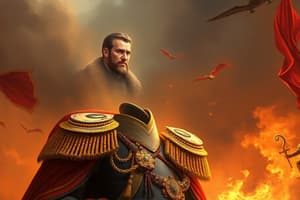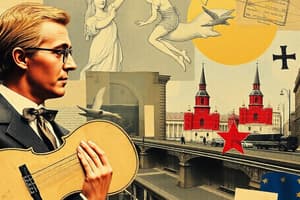Podcast
Questions and Answers
Stalin was exiled to ______ for his actions.
Stalin was exiled to ______ for his actions.
Siberia
Tsar Nicholas II faced economic ______ during his reign.
Tsar Nicholas II faced economic ______ during his reign.
recovery
Grigori Rasputin claimed to possess ______ powers.
Grigori Rasputin claimed to possess ______ powers.
healing
Rasputin became close to the Tsar and Tsarina due to his apparent healing of their son, ______.
Rasputin became close to the Tsar and Tsarina due to his apparent healing of their son, ______.
World War I occurred in ______.
World War I occurred in ______.
Russia was a backwards ______ kingdom
Russia was a backwards ______ kingdom
Alexander the Second is known for freeing the ______
Alexander the Second is known for freeing the ______
The Okhrana was a secret ______ force introduced by Alexander the Third
The Okhrana was a secret ______ force introduced by Alexander the Third
Nicholas II was often criticized for his lack of ______ and decisiveness
Nicholas II was often criticized for his lack of ______ and decisiveness
Vladimir Lenin viewed ______ as a form of oppression of the working class
Vladimir Lenin viewed ______ as a form of oppression of the working class
The peaceful protest led by Father Gapon on Bloody Sunday resulted in the ______ of many citizens
The peaceful protest led by Father Gapon on Bloody Sunday resulted in the ______ of many citizens
Tsar Nicholas II initially agreed to share power with an elected assembly called the ______
Tsar Nicholas II initially agreed to share power with an elected assembly called the ______
Pyotr Stolypin attempted to implement reforms to prevent further ______ in Russia
Pyotr Stolypin attempted to implement reforms to prevent further ______ in Russia
Joseph ______ met Lenin at a communist convention in Finland
Joseph ______ met Lenin at a communist convention in Finland
The Bolsheviks were led by ______, who was known for his uncompromising nature
The Bolsheviks were led by ______, who was known for his uncompromising nature
Flashcards
Who was Grigori Rasputin?
Who was Grigori Rasputin?
A religious figure who claimed to possess healing powers and gained influence in Russia. He was known for his unconventional behavior and controversial parties, attracting negative press attention. He became close to the Tsar and Tsarina due to his apparent healing of their son, Alexei, who suffered from hemophilia.
How did Rasputin affect the Tsar's rule?
How did Rasputin affect the Tsar's rule?
The Tsar's trust in Rasputin, despite scandals, may have contributed to unrest and instability in Russia. His influence on the Tsar's household was seen as a source of scandal and concern.
What was the state of Russia during Tsar Nicholas II's rule?
What was the state of Russia during Tsar Nicholas II's rule?
The Tsar's reign was marked by a period of relative peace and economic prosperity. However, his inaction and reliance on figures like Rasputin potentially contributed to instability during the war.
How did World War I affect Russia?
How did World War I affect Russia?
Signup and view all the flashcards
What is hemophilia?
What is hemophilia?
Signup and view all the flashcards
Okhrana
Okhrana
Signup and view all the flashcards
Divine Right of Kings
Divine Right of Kings
Signup and view all the flashcards
Alexander III's Repressive Policies
Alexander III's Repressive Policies
Signup and view all the flashcards
Bloody Sunday
Bloody Sunday
Signup and view all the flashcards
Soviets
Soviets
Signup and view all the flashcards
The Duma
The Duma
Signup and view all the flashcards
Tsar Alexander II
Tsar Alexander II
Signup and view all the flashcards
Mensheviks
Mensheviks
Signup and view all the flashcards
Vladimir Lenin
Vladimir Lenin
Signup and view all the flashcards
Joseph Stalin
Joseph Stalin
Signup and view all the flashcards
Study Notes
19th Century Russia
- Russia was underdeveloped and lagged behind Europe in modernization.
- Russian rulers showed little interest in liberty or modernization.
- Tsars held absolute power without accountability.
- A severe famine caused widespread suffering and death.
- Russia remained a largely feudal and backward society.
Tsar Alexander II
- Alexander II emancipated the serfs.
- Freed serfs were required to repay their landlords over 49 years.
- Alexander II was a reformer, but his autocratic rule was also criticized.
Tsar Alexander III
- Alexander III felt his father's reforms weakened Tsarist authority.
- He suppressed religious minorities and non-Russians.
- The Okhrana, a secret police force, was established to quell opposition.
- Alexander III was known for his repressive policies.
Tsar Nicholas II
- Nicholas II was perceived as indecisive and unprepared to rule.
- He believed in his divine right to rule as Tsar.
- 1,500 people died in a stampede during his coronation.
- Growing discontent with Tsarist rule followed the coronation.
- Nicholas II was nicknamed "the bloody" due to the Bloody Sunday massacre.
- He was blamed for the lack of modernization and insufficient rights for the people.
Rise of Communism
- Communism was seen as a solution to Tsarist oppression by some Russians.
- Vladimir Lenin, an intellectual, strongly supported communism.
- Lenin believed capitalism exploited the working class.
- Lenin was exiled to Siberia for his communist beliefs.
- Lenin left Russia to collaborate with other Marxists in Europe.
- A communist newsletter was smuggled into Russia.
The Bolsheviks
- Lenin's political party was the Bolsheviks.
- Lenin's uncompromising stance caused a division in the socialist party.
- The Mensheviks were less radical socialists.
- The Mensheviks were wary of Lenin's authoritarian tendencies.
1905 Russian Revolution
- The Tsarist government struggled to modernize and improve people's lives.
- War with Japan was declared to distract from domestic issues.
- Russia suffered an unexpected defeat by Japan.
- The defeat heightened public discontent.
- Father Gapon led a peaceful protest to the Winter Palace.
- The Tsar's troops fired on the crowd, killing 200 and injuring 800.
- The event became known as Bloody Sunday.
- The 1905 Revolution resulted following Bloody Sunday.
- Workers, liberals, and peasants rebelled against Tsarist rule.
- Soviets (local elected councils) emerged from workers' organizing.
The Duma
- Tsar Nicholas II agreed to share power with an elected assembly called the Duma.
- He later reversed this decision and reclaimed power.
- Tsar Nicholas II survived the 1905 Revolution.
Stolypin Reforms
- Pyotr Stolypin, a key advisor to the Tsar, implemented reforms to prevent further unrest.
- He introduced agricultural reforms to improve peasant lives.
- Suppressive measures were taken against opponents to the Tsar, causing many deaths.
- Economic reforms improved the Russian economy.
Lenin and Stalin's Meeting
- Lenin met Joseph Stalin at a communist convention in Finland.
- Stalin became a fund-raiser for the Bolsheviks.
The Bolsheviks
- Stalin was a significant leader within the Bolshevik party.
- Stalin faced exile to Siberia for his involvement.
Tsar Nicholas II
- Tsar Nicholas II presided over a period of economic recovery.
- Initially, significant internal issues were avoided.
Grigori Rasputin
- Rasputin was a religious figure claiming healing powers.
- He rose to prominence and influence in Russia.
- His unconventional behavior and gatherings were controversial.
- Rasputin attracted negative press attention.
- Rasputin gained proximity to the Tsar and Tsarina, due to his alleged healing of their son Alexei.
- Alexei had hemophilia.
- Rasputin's influence within the Tsar's household was highly controversial.
- Despite Rasputin's presence and issues, the Tsar experienced a period of relative peace and economic prosperity.
- Questions arise concerning whether the Tsar's inaction, trusting Rasputin's influence, contributed to upheaval.
World War I
- World War I began in 1914.
- The war was expected to negatively affect Russia, leading to potential unrest.
Studying That Suits You
Use AI to generate personalized quizzes and flashcards to suit your learning preferences.




